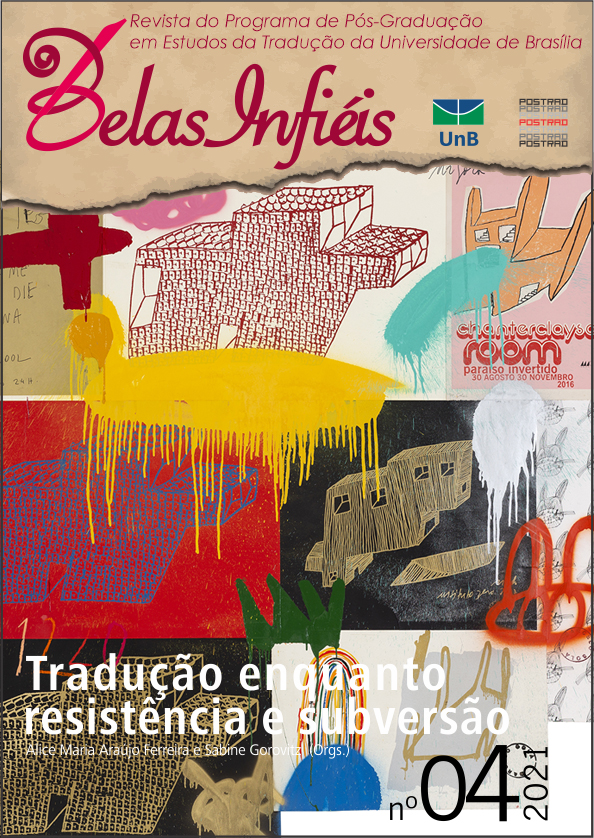La Traduction possede le potentiel d'une critique politique - Entretien avec Alexis Nouss
DOI :
https://doi.org/10.26512/belasinfieis.v10.n4.2021.36758Mots-clés :
Entretien. Critique politique. Traduction. Alexis Nouss.Résumé
L’entretien s’est déroulé par vidéo-conférence le 16 juillet 2020 en pleine pandémie du Covid-19. La conversation commence, justement, par des considérations sur ce moment actuel vécu dans le monde entier et ses répercussions dans l’enseignement ainsi que dans les relations sociales et intersubjectives. Alexis Nouss nous raconte son travail au sein de l’association AGIR et dénonce les politiques actuelles en France relatives à l’accueil des migrants, notamment par rapport à l’OFPRA. Il fait également référence à certains auteurs qu’il considère fondamentaux pour la réflexion sur la traduction, en particulier, Levinas et Benjamin. Pour lui, toute traduction est transformation, une façon d’être avec l’autre, de rentrer dans l’autre. Les réflexions d’Alexis Nouss sur la migration, la condition de l’exilé et la philosophie de la traduction apportent aux questions éthiques et politiques de la traduction un éclairage particulier à partir de l’intraduisible, le mensonge, le secret de l’altérité (son opacité dirait Glissant). Nous souhaitons une agréable lecture en sa compagnie.
Téléchargements
Téléchargements
Publié-e
Comment citer
Numéro
Rubrique
Licence
(c) Tous droits réservés CC BY 2021

Cette œuvre est sous licence Creative Commons Attribution 4.0 International.
Copyright Statement
Given the public access to this journal, the texts are free to use but requires the recognition of the original authorship and initial publication in this journal to be properly stated.
The journal allows the use of works published for non-commercial purposes, including the right to submit the work to publicly accessible databases. Published contributions are the sole and exclusive responsibility of the author(s).
- When submitting papers to be evaluated by the Belas Infiéis journal, the author(s):
- Declare that the contents of the contributions are original and of their original creation, being entirely responsible for their content if there is an objection by third parties.
- Claim to be aware that they should not commit academic plagiarism.
- Declare that the manuscript has not been published, completely or partially, in Portuguese or another language. If it is a translation it should be submitted to the Translated Articles section.
- Declare that the manuscript is not being evaluated by other journals.
- Declare that the manuscript was not submitted to another journal simultaneously.
- Commit(s) to inform the journal of any kind of error or inaccuracy in their contribution (published, in evaluation or in editing) and to collaborate with the editors to make due corrections of the article (when in evaluation or editing) or erratum/retraction (after publication).
- Declare that there is no conflict of interest regarding the published work.
- Authorize its release if it is accepted for publication without any kind of monetary compensation.
- Agree to assign non-exclusive rights to publication to the magazine, remaining free to make their contribution available in other media as long as the publication of the first version in Belas Infiéis magazine is mentioned. They also authorize Belas Infiéis to assign their texts for reproduction in content indexers, virtual libraries and similar platforms.
- Maintain copyright and grant the journal the right of first publication, the work being licensed under theCreative Commons Attribution License.
- Is/Are allowed and encouraged to publish and distribute their work online after the editorial process, which may increase the impact and citation of the published work.
- Authorize the editorial team to make textual adjustments and to adapt the article to the publication rules, when necessary.



















